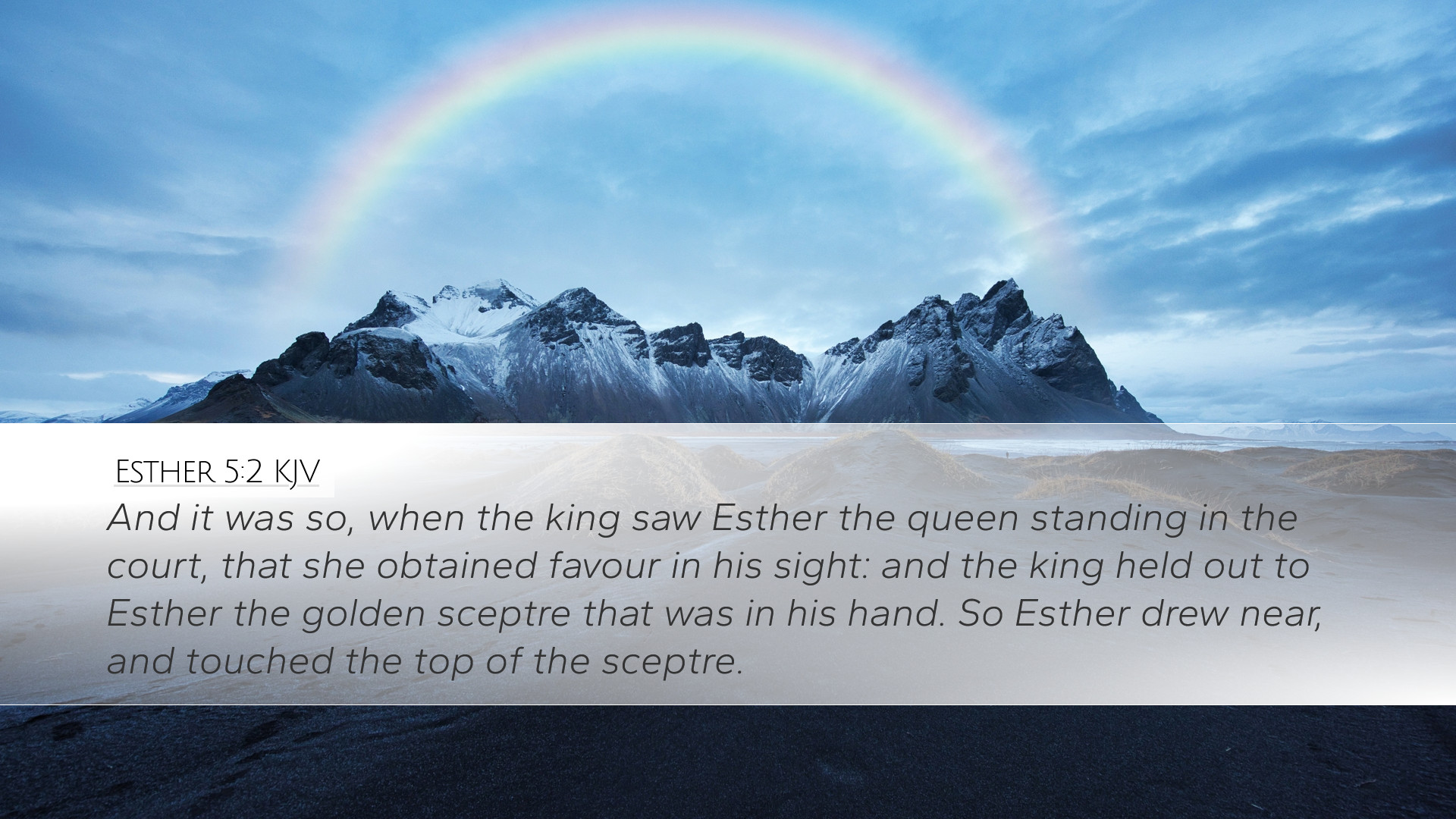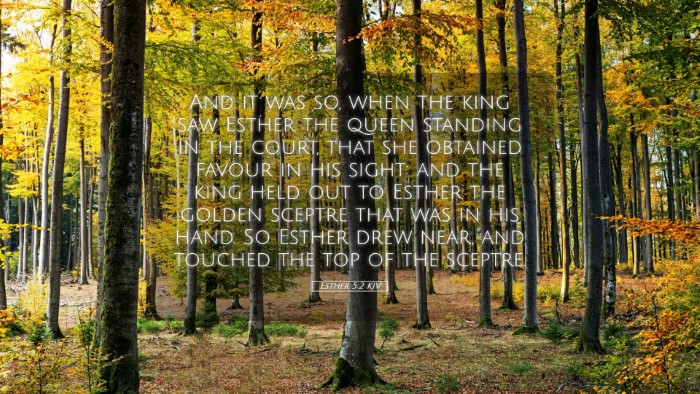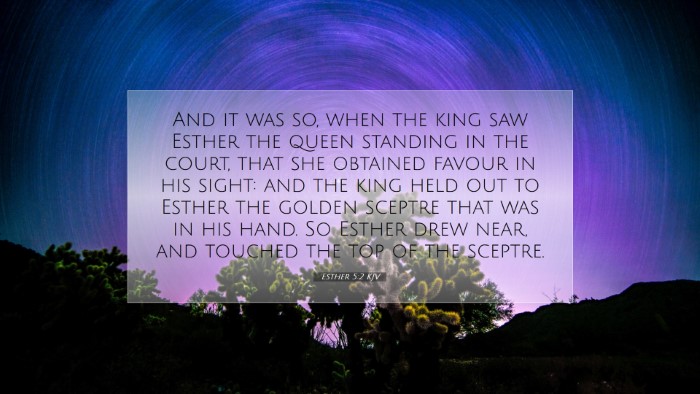Old Testament
Genesis Exodus Leviticus Numbers Deuteronomy Joshua Judges Ruth 1 Samuel 2 Samuel 1 Kings 2 Kings 1 Chronicles 2 Chronicles Ezra Nehemiah Esther Job Psalms Proverbs Ecclesiastes Song of Solomon Isaiah Jeremiah Lamentations Ezekiel Daniel Hosea Joel Amos Obadiah Jonah Micah Nahum Habakkuk Zephaniah Haggai Zechariah MalachiEsther 5:2
Esther 5:2 KJV
And it was so, when the king saw Esther the queen standing in the court, that she obtained favour in his sight: and the king held out to Esther the golden sceptre that was in his hand. So Esther drew near, and touched the top of the sceptre.
Esther 5:2 Bible Commentary
Commentary on Esther 5:2
Esther 5:2 states, "And it was so, when the king saw Esther the queen standing in the court, that she obtained favor in his sight: and the king held out to Esther the golden sceptre that was in his hand. So Esther drew near, and touched the top of the sceptre."
Introduction
This verse serves as a pivotal moment in the unfolding narrative of Esther, illustrating the queen's courage and the theme of divine providence. It marks the beginning of Esther's appeal to King Ahasuerus on behalf of her people, the Jews.
Insights from Public Domain Commentaries
1. Matthew Henry's Commentary
Matthew Henry emphasizes the significance of Esther's position as queen, noting that her standing in the court without an invitation was a matter of great risk. The king's response reflects both his authority and his favor towards Esther. Henry suggests that Esther's approach is emblematic of a believer's approach to God, who holds out the golden sceptre, symbolizing His grace and mercy.
Henry writes, "Esther's coming to the king is a picture of the believer’s coming to Christ, as she came in faith, relying on the goodness she had found in him. The golden sceptre represents the authority and favor of the king, which God extends to His people."
2. Albert Barnes' Notes on the Bible
Albert Barnes provides a detailed analysis of the geopolitical context that surrounds Esther's actions. He notes that Esther's beauty and favor with the king were critical elements that influenced the narrative. By appearing before the king unsummoned, Esther risked her life, highlighting her bravery and commitment to her people.
Barnes reflects, "The holding out of the golden sceptre signifies not merely acceptance but also a desire to grant Esther's request, underscoring the king's affection for her and how grace can change the course of events."
3. Adam Clarke's Commentary
Adam Clarke delves into the symbolic nature of the sceptre. He notes that the king's act of holding out the sceptre indicates both power and the possibility of intercession for others. Clarke points out that this moment is a testament to Esther's faith and strategic approach as she seeks the welfare of her people.
Clarke elaborates, "The act signifies approval and acceptance, as it was a custom for ancient kings to grant audience and protection to those who approached them with respect and earnestness."
Theological Significance
Esther 5:2 resonates deeply with the themes of faith, risk, and divine favor. It serves as an illustration of how God can work through ordinary individuals to accomplish His will, especially when they act with courage and fidelity to their calling.
1. The Nature of Divine Favor
The notion of favor is central to the understanding of this verse. Esther's appeal to the king demonstrates how God's favor operates in human affairs, facilitating the meeting of needs and ensuring the protection of His people.
2. The Role of Intercession
Esther's position highlights the importance of intercession. As believers, we approach God's throne of grace, much like Esther approached the king. This act of touching the sceptre becomes a metaphor for how we can reach out to God in our times of need.
3. The Courage to Stand
Esther's courage in standing before the king serves as a powerful encouragement to believers. It reminds believers of the necessity of boldness when advocating for righteousness and justice.
Practical Applications
- Courage in Leadership: Esther's example encourages leaders to act with bravery, even in uncertain circumstances.
- Intercession: The importance of prayer and intercession for others should be a priority in the life of every believer.
- Confidence in God's Sovereignty: Trusting in God's providence should embolden believers to take rightful actions despite potential risks.
Conclusion
Esther 5:2 is a profoundly rich verse that encapsulates core Christian values of faith, courage, and divine intervention. The insights from the public domain commentaries add layers of understanding to this narrative, urging readers to recognize the responsibilities and privileges that come with their faith. As God's people, like Esther, we are invited to approach the throne of grace with confidence, knowing that we find favor in Him.


